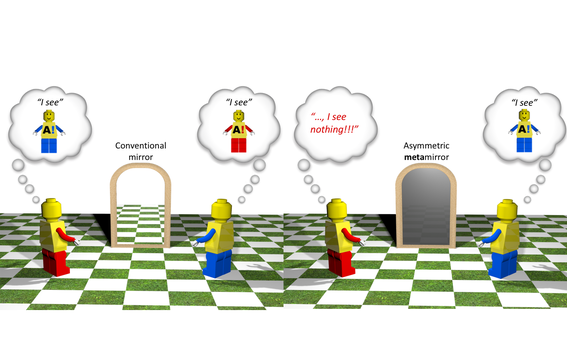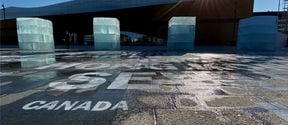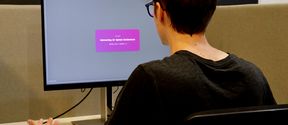What do we see in a mirror? New metasurfaces look “bright” at one direction, while “dark” for the opposite direction

When we look at a mirror from an angle, we see the image of the object located at the opposite direction. This is because the scattering light of the object is reflected by the mirror and then perceived by observers’ eyes. This process, known as specular reflection, is angle-symmetric: if the person stands on the left side of mirror can see the right person, then the right person can always see the left one with the same clearness. Conventional mirrors always have symmetric responses for light coming from both sides of the mirrors. Recently, researchers at Aalto University have successfully broken the angle-symmetric response of a mirror using the concept of gradient metasurfaces. The artificially synthesized surfaces can be designed to look “bright” at one direction, while “dark” for the observer at the opposite direction.
Metasurfaces are planar artificial materials, composed of periodic arranged meta-atoms at subwavelength scale. Meta-atoms are made of traditional materials but, if they are placed in a repeating patterns, the array can show many unusual effects which cannot be realized by the natural materials.. In their article Extreme Asymmetry in Metasurfaces via Evanescent Fields Engineering: Angular-Asymmetric Absorption published in Physical Review Letters, the team from Aalto use gradient metasurfaces to engineer the contrast ratio of brightness for waves coming from two oppositely tilted angles.
“Our findings provide the first demonstration that a flat surface can realize extreme optical asymmetry in angle spectrum. This is an important milestone in both physics and engineering communities,” says Xuchen Wang, who is currently a third-year doctoral student in Aalto University, and also the responsible person of this work. Xuchen studies electromagnetic metasurfaces under the supervision of Prof. Sergei Tretyakov.
The article was published in the online version of the journal on 19 December 2018. The study has received funding from the Academy of Finland.
For further information please contatct Xuchen Wang
Email: [email protected]
Phone: +358-503097794
Institution: Department of Electronics and Nanoengineering, Aalto University
Address: Maarintie 8, 02150 Espoo, Finland
- Published:
- Updated:
Read more news

Aalto EE Introduces Alex: A New Learning Experience Platform to Transform Lifewide Learning and Tackle Upskilling Challenges
Aalto University Executive Education (Aalto EE) is launching Alex in June, a learning platform designed to enhance continuous professional development. Alex offers personalized learning journeys, micro-credentials, and professional development programs, aligning current skills with industry needs. This platform, which continuously evolves with new features like mobile access and AI integration, sets a new standard for professional development in Finland.
Aalto ARTS Summer School explores the significance of water through the lens of art
The theme of School of Arts, Design and Architecture’s Summer School this year is water, and its significance is explored in a multidisciplinary way through the perspectives of art, film and digital.
Just believing that an AI is helping boosts your performance
People perform better if they think they have an AI assistant – even when they’ve been told it’s unreliable and won’t help them